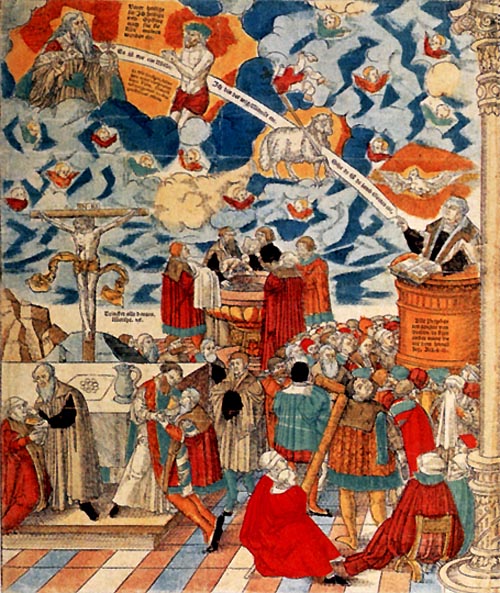Today, however, it is more likely for you to get under somebody's skin for retaining what is catholic and historic than you are for adopting evangelical forms and practices that have no historic tie to Lutheranism. District Presidents are often impatient with those whom they would characterize as rigid and high but easy and tolerant of those who abandon the mass and replace it with evangelical forms and seeker services and contemporary Christian music. We have turned the catholic principle of liturgical preservation inherent in our confession into the enemy and have made adiaphora an excuse to do whatever seems right in the eyes of the local pastor and congregation.
Nevermind that who may change ceremonies was never thought to be so local a decision as a congregation but, among Lutherans, more applicable to the jurisdiction (city, region, etc.). Luther certainly never conceived of every congregation doing its own thing. Now it would seem that we have turned liturgical form and ceremonies into a democracy of preference in which the people in the congregation have sway over what is done and what is not. Again, while it might fit with the culture, it is certainly not the Lutheran way -- nor would it seem, C. F. W. Walther's way of Old Missouri either.
“We do not deny that we are geared up to retain the external worship service as it has long been retained for centuries by the ancient Lutheran Church, in its characteristic, constituent parts and to certify it as such to our congregations. We do not deny, however, that we intend to have no connection at all with the other church fellowships, nor to conform to any of the ceremonies characteristic of the Reformed, Methodists or others. Finally, we in no way consider those who nowadays abandon all the distinctive ceremonies of our church and in their place accept those of foreign churchly fellowships to be true Lutherans.”
(From: “Does Old Lutheranism Lead to Rome?”, a series of articles by C.F.W. Walther in Der Luteraner, Vol. 3, pp. 20f, 27f, 33f, 39f, 45f, 60f, 77f, 79f, 130f. Translated by Fr. Joel Baseley, Assistant Pastor, Emmanuel Evangelical-Lutheran Church of Dearborn, Michigan)

No comments:
Post a Comment